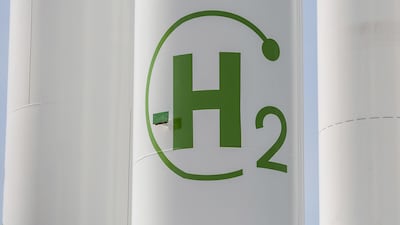Abu Dhabi companies Adnoc and Masdar signed deals on Friday to explore green hydrogen opportunities amid the UAE's efforts to establish itself as a hub for the low-carbon fuel.
Adnoc has teamed up with Japan’s Mitsubishi Heavy Industries to explore potential opportunities in green hydrogen and ammonia value chains.
The companies will also explore research and deployment of carbon management technologies, the state-run energy company said.
“This agreement … builds on the UAE’s long-standing and successful strategic energy relationship with Japan,” said Musabbeh Al Kaabi, Adnoc's executive director of low carbon solutions and international growth.
“Our combined expertise and commitment to advancing carbon neutral technologies offers great potential to help accelerate Adnoc’s journey to net zero by 2045.”
Low-carbon hydrogen and ammonia are critical to decarbonising hard-to-abate industries and meeting growing global demand for cleaner feed stock for power generation.
Adnoc is building a one million tonnes-per-year low-carbon ammonia production facility at the Ta'ziz industrial ecosystem and chemicals hub in Ruwais, Abu Dhabi.
The company has also shipped several demonstration cargoes of low-carbon ammonia to customers in Asia and Germany.
“We are looking forward to contributing to Adnoc’s net-zero ambition through our reliable technology in the coming projects under this agreement,” said Hitoshi Kaguchi, senior executive vice president at Mitsubishi Heavy Industries.
Separately, Abu Dhabi clean energy company Masdar signed an initial agreement with Austria's OMV to explore the production of green hydrogen for the decarbonisation of industrial processes in OMV’s refineries.
The deal forms the basis of a joint agreement to develop an industrial large-scale electrolysis plant, which will be powered by renewable energy, Masdar said in a statement.
The companies will collaborate to develop the project and plan to make a final investment decision in the second half of 2024.
“This co-operation agreement … is another step in the right direction towards building a robust hydrogen value chain and supports our ongoing aim of one million tonnes of green hydrogen per annum globally by 2030,” said Mohammad Al Ramahi, Masdar’s chief green hydrogen officer.
The Emirates, the Arab world’s second-largest economy, aims to achieve hydrogen production of 1.4 million tonnes annually by 2031, increasing to 15 million tonnes a year by 2050.
The country is planning to develop at least two hydrogen production hubs, or oases, by 2031.
Masdar, which is active in more than 40 countries, aims to expand its capacity to about 100 gigawatts of renewable energy by the end of the decade.
This week, Masdar and Spain’s Iberdrola signed a €15 billion ($16.25 billion) partnership to evaluate the development of offshore wind and green hydrogen projects in key markets including Germany, the UK and the US.
On Thursday, Masdar also signed a deal with Austria's Verbund Green Hydrogen to explore the feasibility of building one of Europe’s largest green hydrogen production plants in central Spain.
The plant, to be operational by the end of the decade, would aim to generate green hydrogen to cover industrial demand in Spain and central Europe, the companies said.
The fuel produced is expected to be used to decarbonise Spain or Europe’s hard-to-abate sectors, which could include steel production, fertilisers, chemicals, heavy transportation and aviation.
It is intended that the plant would produce the fuel using renewable energy generated by solar power plants, potentially including Masdar’s planned gigawatt-scale solar plant in Castilla-La Mancha, and onshore wind farms, the companies said.
The study will evaluate if green hydrogen produced at the plant has the potential to displace up to one million tonnes of carbon emissions annually.
There is huge growth potential for green hydrogen in Europe. Spain currently consumes around 500,000 tonnes of mainly traditional fuel-derived grey hydrogen per year, which could be gradually replaced with green hydrogen.
By 2035, Austria alone is expected to require around 600,000 tonnes per year of clean hydrogen, the companies said.

